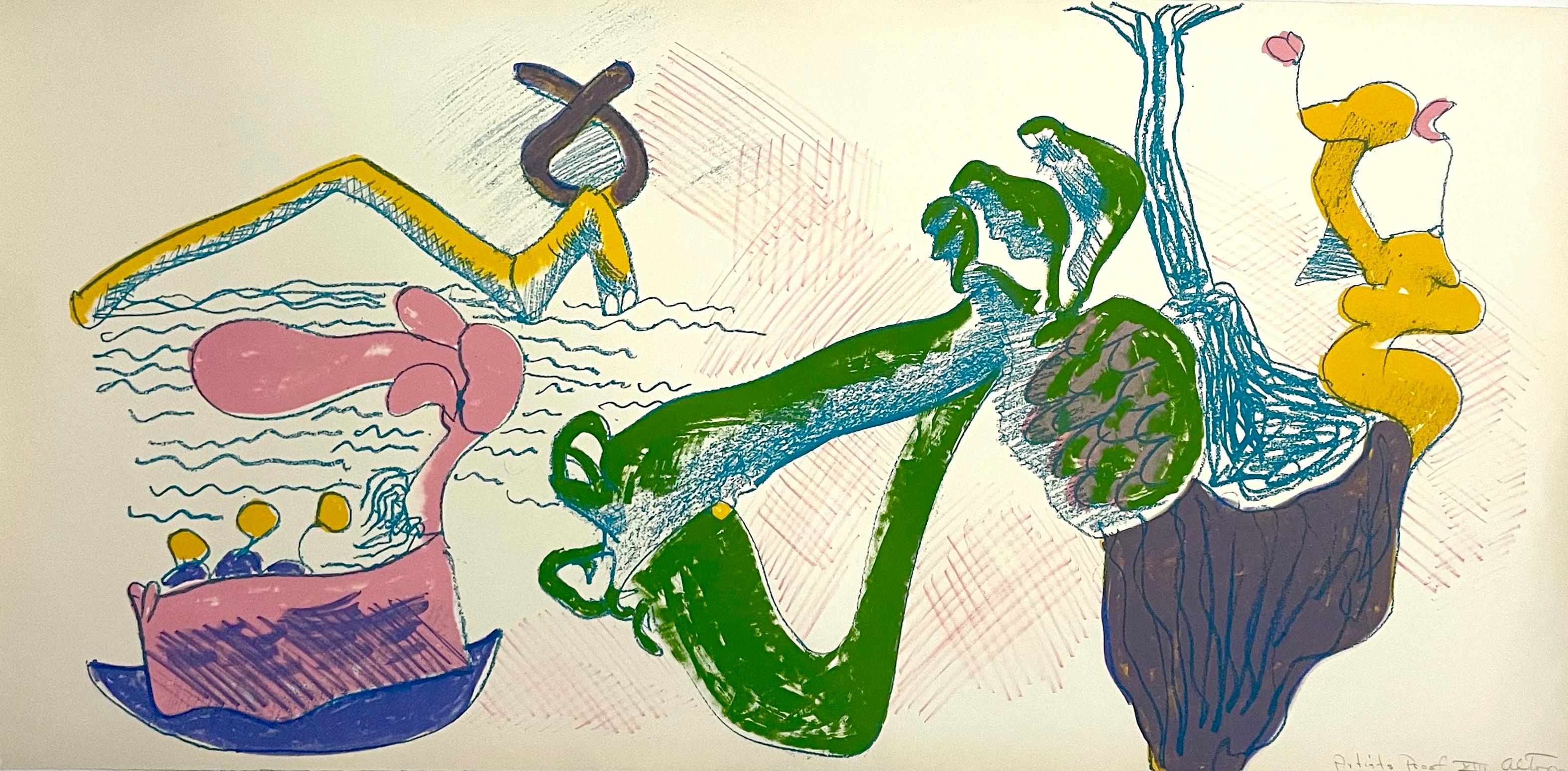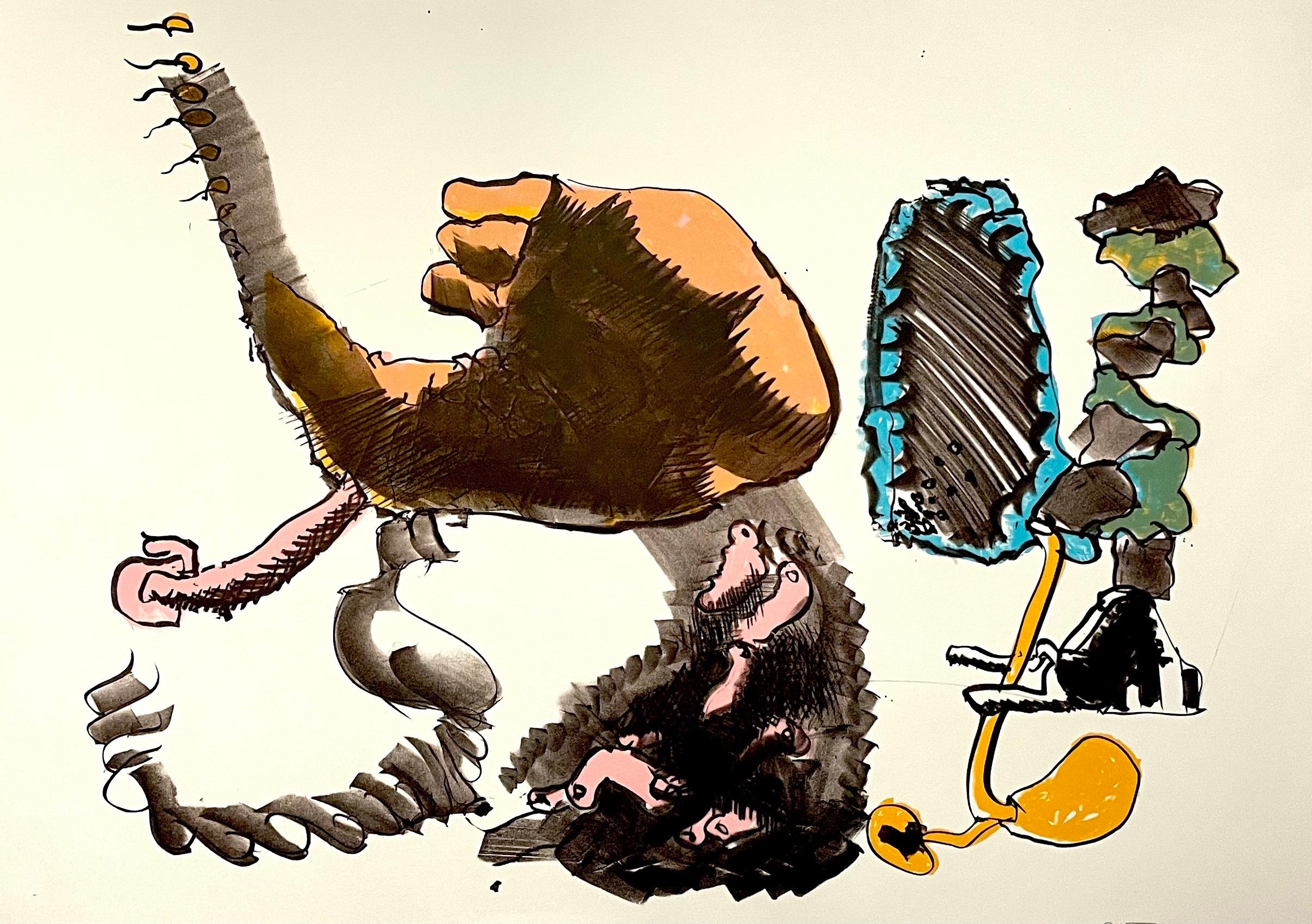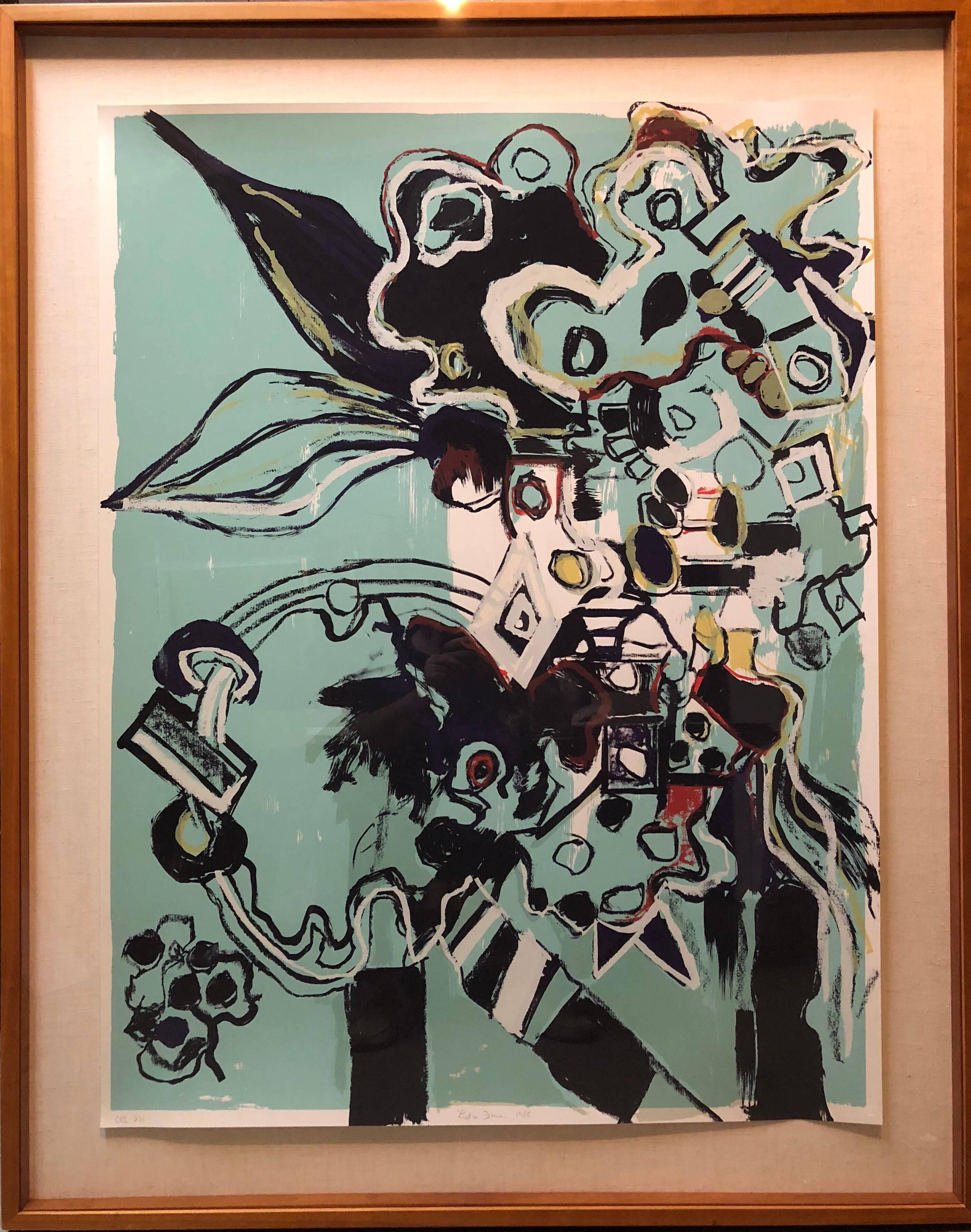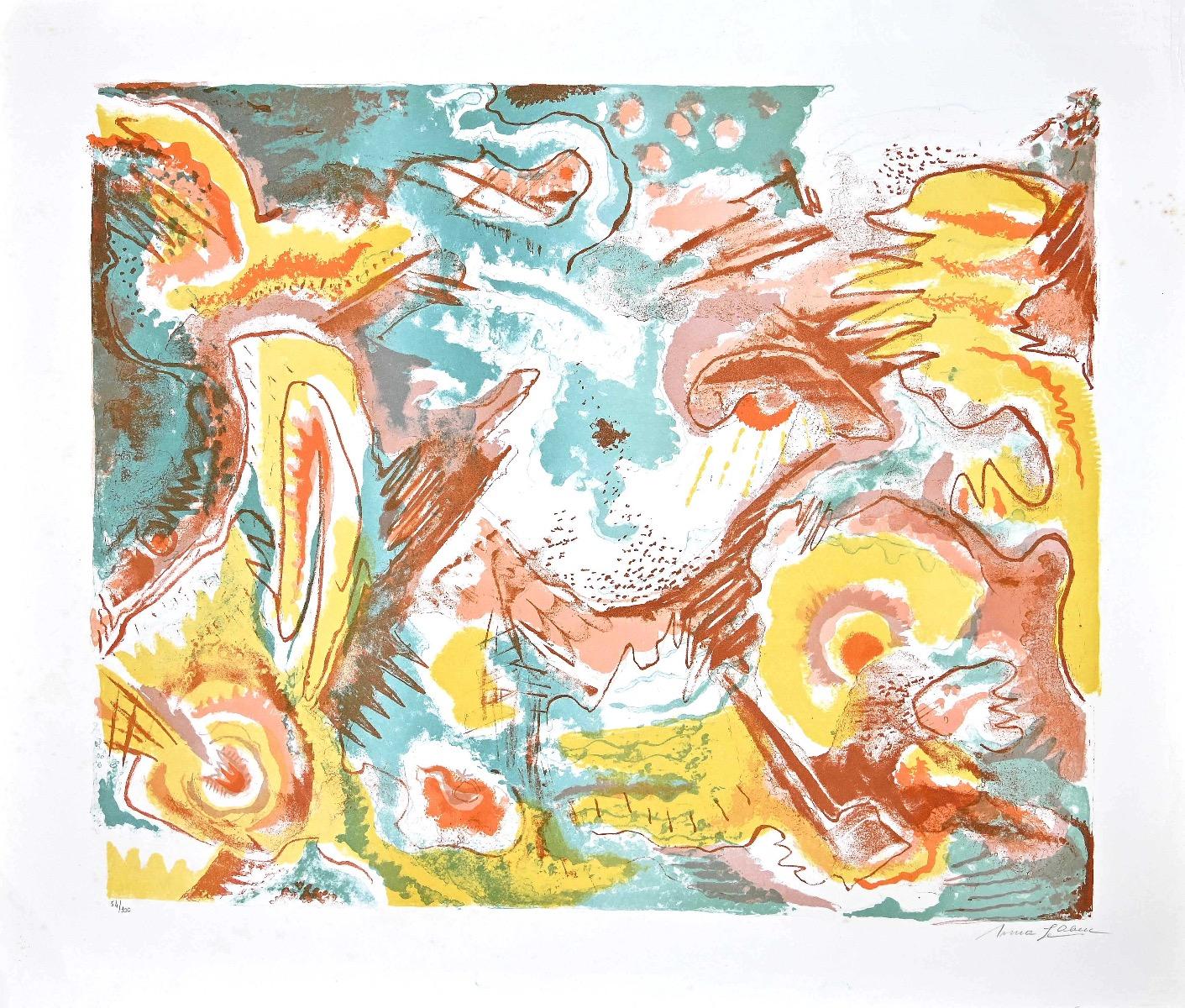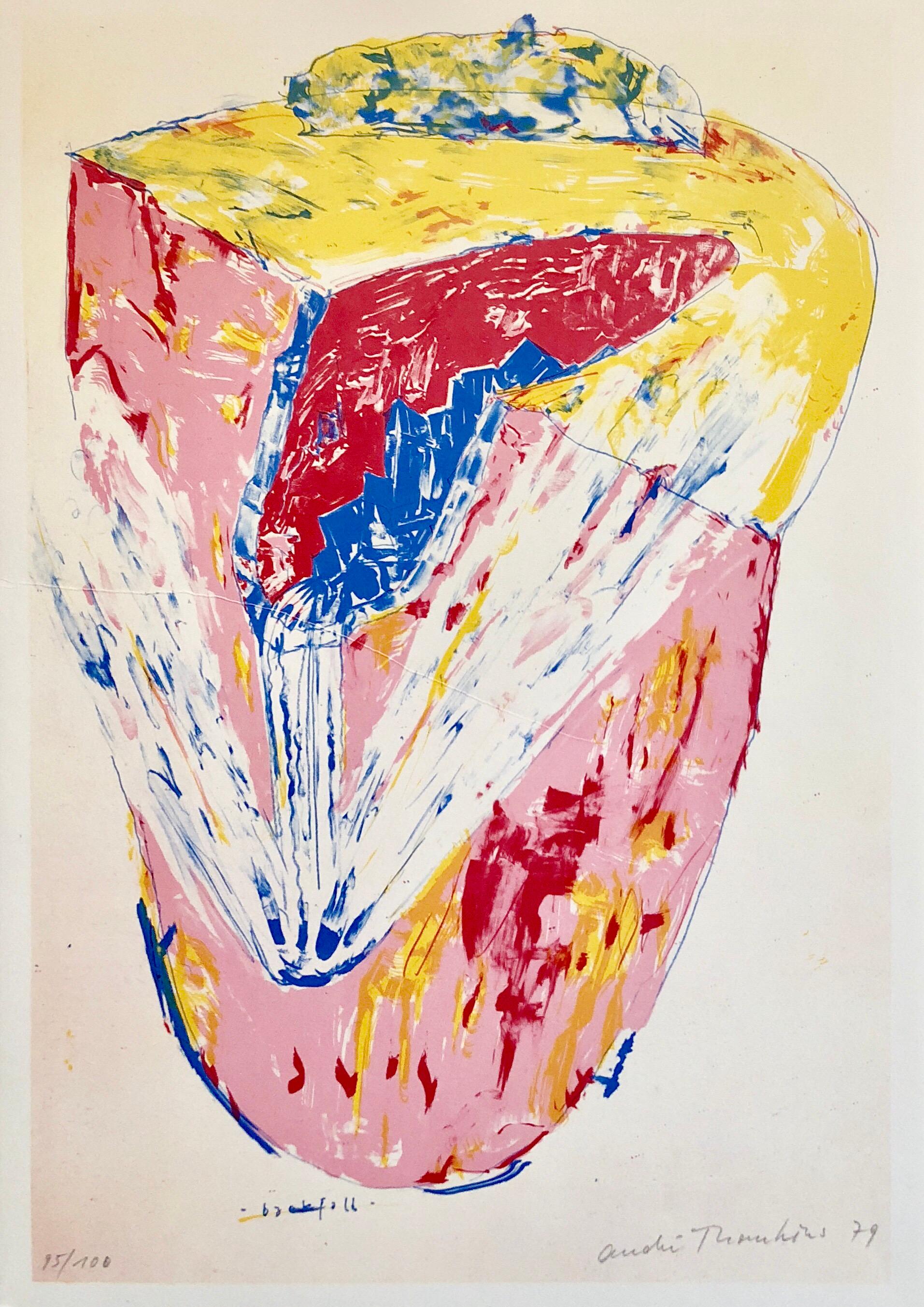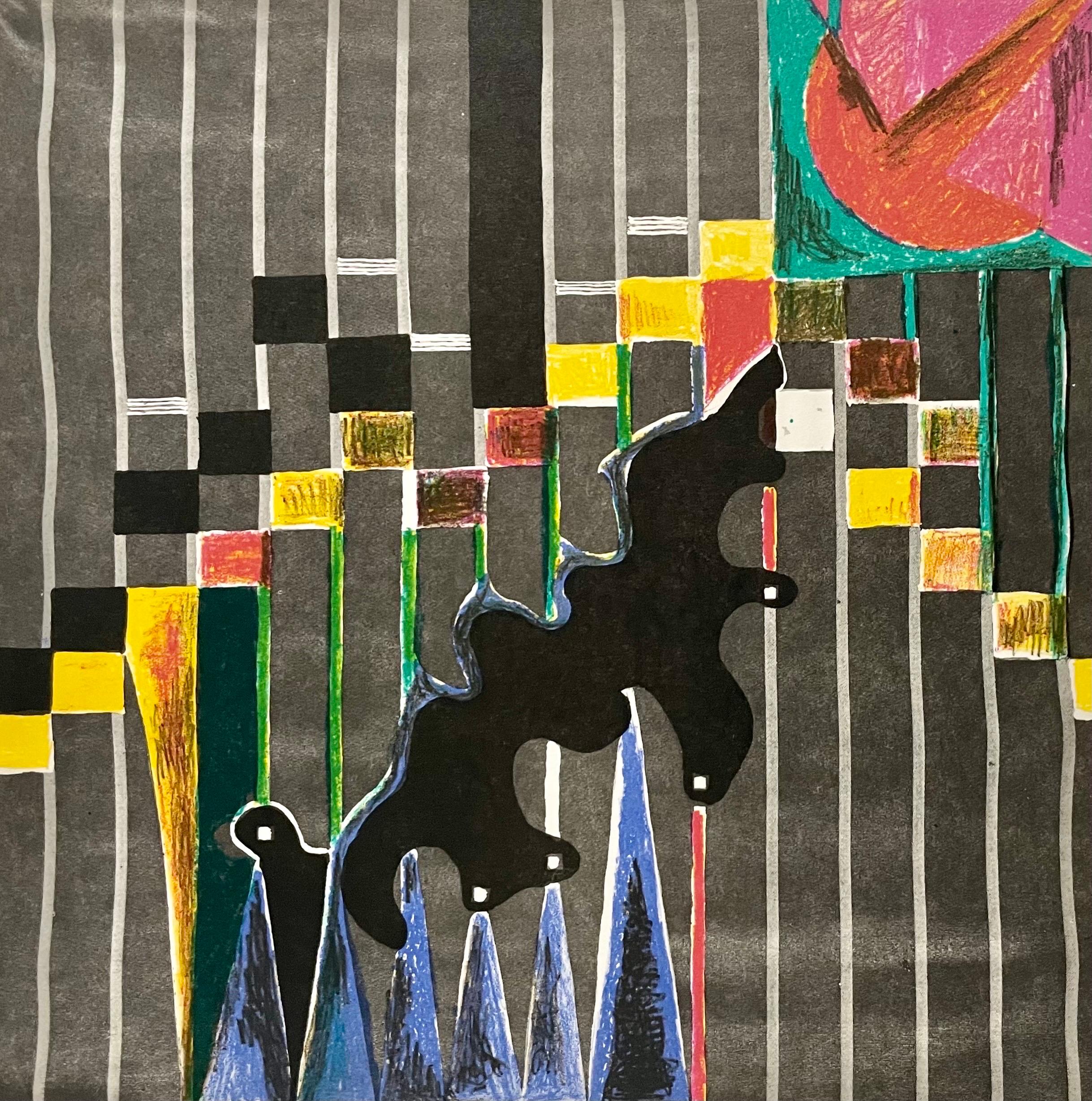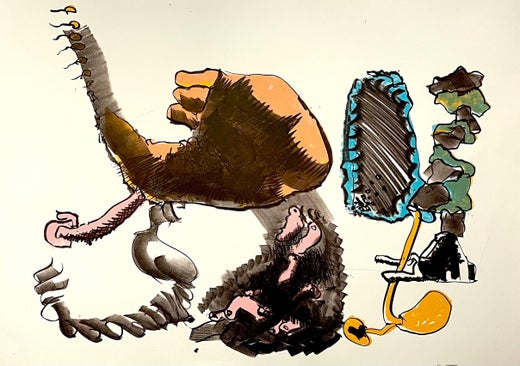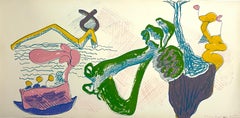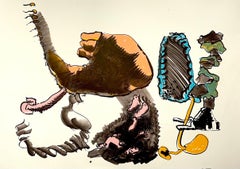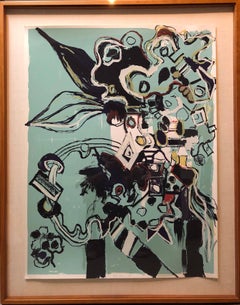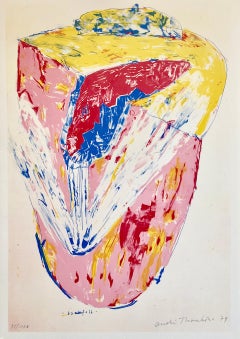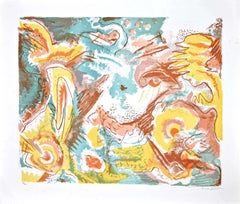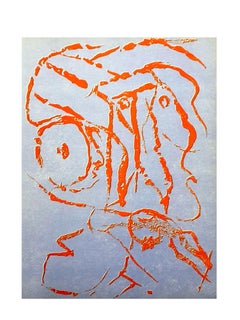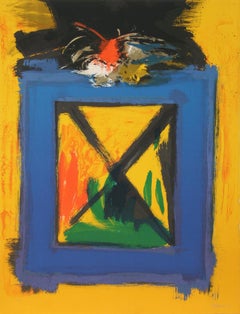Items Similar to California Pop Art Abstract Expressionist LA Lithograph John Altoon About Women
Want more images or videos?
Request additional images or videos from the seller
1 of 12
John AltoonCalifornia Pop Art Abstract Expressionist LA Lithograph John Altoon About Women1966
1966
$1,000
£762.98
€868.59
CA$1,405.51
A$1,545
CHF 811.12
MX$18,371.15
NOK 10,416.59
SEK 9,488.39
DKK 6,489.74
About the Item
Hand signed and numbered
About Women
Printed by Kenneth E. Tyler; published by Gemini G.E.L.
John Altoon (1925 - 1969), an American artist, was born in Los Angeles to immigrant Armenian parents. From 1947–1949 he attended the Otis Art Institute, from 1947 to 1950 he also attended the Art Center College of Design in Los Angeles, and in 1950 the Chouinard Art Institute. Altoon was a prominent figure in the LA art scene in the 1950s and 1960s. Exhibitions of his work have been held at the Museum of Contemporary Art San Diego, Whitney Museum of American Art, New York, Corcoran Gallery, Washington D.C, Fine Arts Museums of San Francisco, The Baxter Museum, Pasadena, and The Los Angeles County Museum of Art (LACMA).
Altoon's work was influenced by the Abstract Expressionism Movement although he is best known for his figurative drawings of the 1960s, with as Leah Ollman describes "a vocabulary of vaguely figurative, botanical and biological forms that he pursued until his death." He was part of the "Ferus group" of artists so called for their association to the Ferus Gallery that operated in Los Angeles in 1957–1966. Some of the other artists included in this group are Edward Kienholz, Larry Bell, Robert Irwin, Billy Al Bengston. He was featured in the Cool School documentary, a film about Altoon and other Ferus Gallery artists such as Walter Hopps and Ed Kienholz, Craig Kauffman, Wallace Berman, Ed Moses, John Altoon, and Robert Irwin. many Ferus artists say John was the most fun and friendliest of all, every where everyone liked him. He could charm anyone. Altoon, during his Ferus Gallery years, did the Ocean Park series which depicted an area around Venice and Santa Monica beach towns in California. The series was 18 paintings as well some works he did on paper. It had the direct from brain to hand & brush approach he was known for: the abstracting of nature on his canvas by pushing through a spontaneous approach, freehand biomorphic in design giving us his surrealist interpretation as a direct rendering of the coastal surroundings.
Leah Ollman describes his life a 1999 article in Art in America, "With his outsized personality and reckless intensity, John Altoon loomed large in the L.A. art scene of the '50s and '60s.
Altoon was diagnosed as schizophrenic in his late 30s and suffered bouts of depression and paranoia. I
Irving Blum, partner in the Ferus Gallery, recalls: "If the gallery was closest in spirit to a single person, that person was John Altoon--dearly loved, defiant, romantic, highly ambitious--and slightly mad." Altoon's struggle with mental illness, his big, dark, robust personality and his early death from a heart attack at 44 have, even more than his art itself, come to define his legacy."
- Creator:John Altoon (1925 - 1969)
- Creation Year:1966
- Dimensions:Height: 19 in (48.26 cm)Width: 19 in (48.26 cm)
- Medium:
- Movement & Style:
- Period:
- Condition:minor wear. never been framed. possible light toning.
- Gallery Location:Surfside, FL
- Reference Number:1stDibs: LU38215994052
John Altoon (1925-1969) was an artist and commercial illustrator known for loose drawings of botanicals and natural form. His work crosses a hybrid between abstract and figurative, influenced by Abstract Impressionism. Altoon used color and line movement to connect sociopolitical messages with the viewer’s eye. A prominent member of the Ferus Gallery’s group of artists and Wallace Berman’s Semina circle, Altoon was influenced of artists like Pablo Picasso in creating raw, satirical pieces of work. Born in Los Angeles, John Altoon attended the Otis Art Institute, the Art Center College of Design, and the Chouinard Art Institute. His work has been exhibited at the Museum of Contemporary Art San Diego, the Whitney Museum of American Art, New York, and Fine Arts Museums of San Francisco.
About the Seller
4.9
Platinum Seller
Premium sellers with a 4.7+ rating and 24-hour response times
Established in 1995
1stDibs seller since 2014
1,846 sales on 1stDibs
Typical response time: <1 hour
- ShippingRetrieving quote...Shipping from: Surfside, FL
- Return Policy
More From This Seller
View All1960's California Pop Art Abstract Expressionist LA Lithograph "About Women"
Located in Surfside, FL
John Altoon (American, 1925-1969)
From the 'About Women' Series.
Color lithograph
1965/66,
Hand signed and editioned in pencil with the chop mark of Gemini G.E.L. publishers
John Altoon (1925 - 1969), an American artist, was born in Los Angeles to immigrant Armenian parents. From 1947–1949 he attended the Otis Art Institute, from 1947 to 1950 he also attended the Art Center College of Design in Los Angeles, and in 1950 the Chouinard Art Institute. Altoon was a prominent figure in the LA art scene in the 1950s and 1960s. Exhibitions of his work have been held at the Museum of Contemporary Art San Diego, Whitney Museum of American Art, New York, Corcoran Gallery, Washington D.C, Fine Arts Museums of San Francisco, The Baxter Museum, Pasadena, and The Los Angeles County Museum of Art (LACMA).
Altoon's work was influenced by the Abstract Expressionism Movement although he is best known for his figurative drawings of the 1960s, with as Leah Ollman describes "a vocabulary of vaguely figurative, botanical and biological forms that he pursued until his death." He was part of the "Ferus group" of artists so called for their association to the Ferus Gallery that operated in Los Angeles in 1957–1966. Some of the other artists included in this group are Edward Kienholz, Larry Bell, Robert Irwin, Billy Al Bengston. He was featured in the Cool School documentary, a film about Altoon and other Ferus Gallery artists such as Walter Hopps and Ed Kienholz...
Category
1960s Abstract Expressionist Abstract Prints
Materials
Lithograph
Large 1960's California Pop Art Abstract Expressionist LA Lithograph John Altoon
Located in Surfside, FL
John Altoon (1925-1969)
UNTITLED, 1966, color lithograph, hand signed in pencil and inscribed trail proof II, sheet 29 ¾ x 41 ¼, printed by Gemini G.E.L., with their blind stamp low...
Category
1960s Abstract Expressionist Abstract Prints
Materials
Lithograph
Large Format Modernist Abstract Lithograph Silkscreen Print Woman Artist
By Lydia Dona
Located in Surfside, FL
1982-84 Hunter College, New York (M.F.A.)
1978-80 School of Visual Arts, New York
1973-77 Bezalel Academy of Art, Jerusalem (B.F.A.)
American, born in Romania
Lives and works in New York City
Solo Exhibitions
2008 Michael Steinberg Fine Art, New York
2006 Galeria Joan Prats, Barcelona
2005 Karpio + Facchini Gallery, Miami
Jacob Karpio Galeria, San Jose (Costa Rica)
2004 Michael Steinberg Fine Art, New York
2001 Marella Arte Contemporanea, Milan
2000 Von Lintel & Nusser, New York
Galerie Von Lintel & Nusser, Munich
1998 Galerie Thomas von Lintel, Munich
1997 Galerie des Archives, Paris
1995 Galerie Samuel Lallouz, Montreal
L.A. Louver, Los Angeles
1994 Marc Jancou Gallery, London
Galerie des Archives, Paris
1993 Galerie Barbara Farber, Amsterdam
Real Art Ways, Hartford (Connecticut)
1992 Tom Cugliani Gallery, New York
Galerie Marc Jancou, Zurich
Galerie des Archives, Paris
1989 Tom Cugliani Gallery, New York
Galerie Barbara Farber, Amsterdam
Studied at bezalel from 1973 to 1977. And it was a very fascinating time because it was a highly conceptually based school. Very much influenced by Joseph Beuys, and European Conceptualism, I didn’t really like the atmosphere there that much, because it was dominated by male painters like Jörg Immendorf, Marcus Lupertz, and a few others. then came to New York to study at SVA for two years. New York in 1978 was exciting. I was very lucky to be in a class that was full of very bubbly and very energetic artists like Keith Haring, Kenny Scharf, Tim Rollins, Moira Dryer, Frank Holliday, and Tom Cugliani (who later became one of my dealers).The eighties were dominated largely by Neo-Expressionist paintings. There were Germans, such as Baselitz, Kiefer, Richter, Penck, and the Italians, Clemente, Chia, Cucchi, Palladino as well as Schnabel, Fischl, Basquiat, Salle, and many others, but all of their paintings were figuratively based. But below the popular consent, there was a group of painters who were working more in the vein of what Stephen Westfall referred to as “Neo-Surrealism,” including George Condo, Jeffrey Wasserman, Kenneth Scharf, David Humphrey. However, I felt that Carroll Dunham and you were the only two painters who seemed to be less interested in the kind of narrative, lyrical, or let’s say, stationary composition. He belongs to the generation of Terry Winters, Elizabeth Murray, David Reed and Jonathan Lasker but in some strange way, if we’re looking back to the mid-eighties, we have to include New Image painters like Susan Rothenberg, Neil Jenney, and Robert Moskowitz who were working in between the figure and abstraction with a kind of condensation and compression, in relationship, lets say, to cartoon imagery. There are artists like Jeff Koons, or even Damien Hirst who took the Duchampian aspect and brought it into the continuity of his readymade. But for me, I see no difference between the crack in “Large Glass” and the drips in Jackson Pollock’s paintings. There was something that I felt in my own equation of the continuity between Paul Klee, Duchamp, Picabia, and, oddly enough, Clyfford Still.
What essentially is important is how different artists carry on a dialogue among themselves so that they can all keep their work vital. Whether from the abstract paintings of Richmond Burton, Fabian Marcaccio extending the borders of his paintings on to the wall, or Cady Noland’s early scattered installation, my own pre-occupation with machinery, urban environment, and the Duchampian models has always materialized in relationship to other forms of art making.
Selected Group Exhibitions:
2014 Drawing on Difference: An Ambition by Saul Ostrow and Lidija
Slavkovic, Studio Vendome Gallery, New York.
2013 Drawing on Habit: An Ambition by Saul Ostrow and Lidija Slavkovic,
South Carlton Beach and The Betsy-South Beach Exhibition Programs,
Art Basel, Miami Beach.
2013 Imprinted Pictures: Lydia Dona...
Category
1980s Abstract Expressionist Abstract Prints
Materials
Lithograph, Screen
1970s Modernist Swiss Colorful Surrealism Signed Dada Lithograph Andre Thomkins
By André Thomkins
Located in Surfside, FL
This one is titled "Backfall" It depicts what looks like an abstract Chihuly sculpture or lithograph in pink, blue, red and yellow colors.
Published by Edition Hansjörg Mayer, Stuttgart They published concrete poetry and art books by Mark Boyle, Richard Hamilton, Dorothy Iannone, John Latham, Tom Phillips, Dieter Roth, André Thompkins and Emmett Williams, to name just a few.
André Thomkins (1930 - 1985) was a Swiss painter, illustrator, and poet. He attended art-school, taught by Max von Moos, 1947 – 1949 and the Académie de la Grande Chaumière, Paris, France, 1950. From 1952, he lived in Germany and taught at the Kunstakademie Düsseldorf between 1971 and 1973.
Thomkins painted and drew ironic and fantastic pictures influenced by surrealism and dadaism. Together with Dieter Roth and Daniel Spoerri he prepared works of Eat Art. He also was a writer of palindromes. His friends and collaborators included Daniel Spoerri, Dieter Roth, George Brecht, Richard Hamilton and Karl Gerstner, Thomkins gained a reputation as an ‘artist’s artist’, and is considered one of the most important Swiss artists of the second half of the twentieth century.He died in 1985.
His work is currently represented by Hauser & Wirth Zurich, Switzerland.
Select group exhibitions:
2018
Kunsthalle Krems, 'Pablo Picasso. Arshile Gorky, Andy Warhol. Sculptures and Works on Paper. Hubert Looser Collection', Krems, Austria
2017
Kunsthandel Wolfgang Werner, 'Martin Barré, Karl Otto Götz, Ernst Wilhelm Nay, André Thomkins',
Berlin, Germany
2013
Fabian & Claude Walter Galerie, 'Schweizer Avantgarde Kunst nach 1940', Zurich, Switzerland
2009
The Modern Institute, 'Thomas Houseago, Dieter Roth, Andre Thomkins', Glasgow, England
Museum of Modern Art, 'Compass in Hand: Selections from the Judith Rothschild Collection', NYC
2004
Kunsthandel Wolfgang Werner, 'Arman, Baumeister, Götz, Graubner, Tàpies, Thomkins', Berlin,
Germany
1994
Kunstmuseum Solothurn, 'Eine Schenkung. Grafik von Eduardo Chillida, Antoni Tàpies, Alexander Calder, Jean Dubuffet, Ben Nicholson, Giacometti, Tinguely, Thomkins', Solothurn, Switzerland
1992
Galerie Littmann, Tinguely zu Ehren. A Tribute to Jean Tinguely. Hommage à Tinguely, Basel,
1988
Museum Ludwig, 'Uebrigens sterben immer die anderen. Marcel Duchamp und die Avantgarde seit
1950', Cologne, Germany
1987
Aargauer Kunsthaus, 'Otto Grimm. Marc-Antoine Fehr. Christoph Gredinger', Aarau, Switzerland
Cercle Municipal, 'Art contemporain suisse. Collection de la Banque du Gothard', Luxembourg,
1985
Centre national d'art et de culture Georges Pompidou, 'Livres d'artistes', Paris, France
Rathaus, 'Claude Sandoz – Hans Schärer...
Category
1970s Dada Figurative Prints
Materials
Lithograph, Offset
Feminist Surrealist French Abstract Colorful Lithograph Print Myriam Bat Yosef
Located in Surfside, FL
Myriam Bat-Yosef
Surrealist abstract lithograph print in colorful abstract shapes and shades
Hand signed and dated 1971.
sheet measures 9.25 X 9.25 inches
...
Category
1970s Surrealist Abstract Prints
Materials
Lithograph
Feminist Surrealist French Abstract Colorful Lithograph Print Myriam Bat Yosef
Located in Surfside, FL
Myriam Bat-Yosef
Surrealist abstract lithograph print in colorful abstract shapes and shades
Hand signed and dated 1971.
sheet measures 9.25 X 9.25 inches
The envelope and the Peter Buch poster is just for provenance and is not included in this sale.
Myriam Bat-Yosef, whose real name is Marion Hellerman, born on January 31, 1931 in Berlin, Germany to a Jewish family from Lithuania, she is an Israeli-Icelandic artist who paints on papers, paintings, fabrics, objects and human beings for performances. Myriam Bat-Yosef currently lives and works in Paris. In 1933, her family fleeing the Nazi Holocaust, Miriam Bat-Yosef emigrates to Palestine and settles in Jaffa. In 1936, she suffers a family tragedy, her father, militant Zionist, is called to fight, still recovering from an operation of appendicitis. The incision will become infected, antibiotics did not exist yet, and her father will die in the hospital after 9 months of suffering.
Myriam and her mother leave Palestine to live in Paris for three years. French is Myriam's first school language. In 1939, still fleeing Nazism, she returned to Palestine, leaving France by the last boat from Marseille. She moved to Tel Aviv with her mother, aunt and maternal grandmother.
In 1940, she began attending the Academy of Fine Arts in Tel Aviv and took her name as an artist, Bat-Yosef, which means Joseph's daughter in Hebrew, as a tribute to her father. In 1946, Myriam graduated as a kindergarten teacher but wanted to be an artist. Her mother enrolled her in an evening school to prepare a diploma of art teacher. At 19, she performs two years of military service in Israel.
In 1952, with a pension of $50 a month that her mother allocated, she went to study at the Beaux-Arts in Paris. To survive, she has several activities while studying. In 1955, she had her first solo exhibition, at the Israeli Club on Wagram Avenue in Paris. Many artists, such as Yaacov Agam, Yehuda Neiman Avigdor Arikha, Raffi Kaiser, Dani Karavan and sculptors Achiam and Shlomo Selinger attended the opening .
In 1956, she enrolled at the School of Fine Arts in Florence. This is where she meets the painter Errô. They share an icy studio in winter. Myriam moves to Milan with friends. She organizes a joint exhibition with Erro, one room each, at the Montenapoleone gallery. Her works are admired by the sculptor Marino Marini and the painters Renato Birolli and Enrico Prampolini. Myriam and Erro exhibit in Rome, Milan, Florence and meet many personalities: Alain Jouffroy and his wife, the painter Manina, Roberto Matta and his wife Malitte, textile artist who was one of the founders of the Pompidou Center. Back in Paris, Myriam and Erro get married, which allows Myriam to avoid being called into the Israeli army during the Suez Canal War.
In 1957, Myriam and her husband went to Iceland. Myriam works in a chocolate factory. Having enough money, she starts producing art again. She exhibited in Reykjavik's first art gallery. She meets the artist Sigridur Bjornsdottir, married to the Swiss painter Dieter Roth .
In 1958, Myriam and her husband leave for Israel. They exhibit in Germany, then in Israel. Back in Paris, the couple became friends with artists of the surrealist movement, such as Victor Brauner, Hans Bellmer, the sculptor Philippe Hiquily, Liliane Lijn, future wife of Takis and photographer Nathalie Waag. Erro and Myriam have a daughter on March 15, 1960, named Tura, after the painter Cosmè Tura, but also close to the Icelandic Thora or the Hebrew Torah. Bat-Yosef’s complex trajectory throughout the 20th century is linked as much to the transnational history of what was for a time called the School of Paris as it is to a certain legacy of Surrealism. Her work features the same idea of resolving antinomies that also defined the spirit of surrealism, and is enhanced with her readings of the Kabbalah and her spiritual grounding in Taoism. However, while there are reasons for her approach to be associated with the process of the ready-made, it is important to consider the immediate intrication of these works with her practice of performance, during which the body itself is also painted – a feminist response to Yves Klein’s Anthropometries (1960) and an echo of the happenings which Jean-Jacques Lebel organised at the time in Paris.
In 1963, Erró told Myriam that if she wants to be a painter, she can not be his wife. Myriam chose to be a painter and the couple divorced in 1964. Since that time, Myriam Bat-Yosef has exhibited in many countries: Europe, United States, Japan, etc.
Although long in the shadows, the work of Myriam Bat-Yosef has been greeted by many artists and personalities: Anaïs Nin, Nancy Huston, André Pieyre of Mandiargues, José Pierre, René de Solier , Jacques Lacarrière, Alain Bosquet, Pierre Restany, Sarane Alexandrian and Surrealist André Breton who, after a visit to her studio, confided to having been intrigued by its phantasmagorical dimension. She was included in the book Pop Art and Beyond: Gender, Race, and Class in the Global Sixties by Mona Hadler and Kalliopi Minioudaki. Extract "World Citizen, Artist of the Pop Era Sarah Wilson; Why do we know so little of Myriam Bat-Yosef, the most important female Israeli artist of the Pop era? Issues of identity and sexuality feature constantly in her work. She exhibited internationally from Reykjavik to Tokyo; she had two shows at Arturo Schwarz’s famous Dada/surrealist gallery in Milan; she participated in feminist art events in Los Angeles. Above all, in 1971, she conceived Total Art, a Pop Gesamtkunstwerk inside and outside the Israel Museum, Jerusalem. Painter, performer, and installation artist, she was also a lover, wife, and mother. Of Lithuanian-Jewish descent, she was close to the family of philosopher Emmanuel Levinas. An émigré in Paris she would repudiate a national passport, participating in Garry Davis’s short-lived “World Citizens” movement. She continues the lineage of women surrealist artists: Valentine Hugo, Leonor Fini, Dorothea Tanning, Leonora Carrington, Unica Zürn, Jane Graverol, Toyen, Alice Rahon...
Category
1970s Surrealist Abstract Prints
Materials
Lithograph
You May Also Like
Surrealistic Composition - Original Lithograph by Le Oben - 1970s
By Le Oben
Located in Roma, IT
Surrealistic Composition is an original lithograph realized by Le Oben in 1970s.
This original print is hand signed. This is an edition 54 of 100 pieces.
Category
1970s Modern Abstract Prints
Materials
Lithograph
Pierre Alechinsky - Composition - Original Lithograph
Located in Collonge Bellerive, Geneve, CH
Pierre Alechinsky - Composition - Original Lithograph
From the literary review "XXe Siècle"
1960
Dimensions: 32 x 24 cm
Publisher: G. di San Lazzaro.
Unsigned and unumbered as issued
Category
1960s Abstract Abstract Prints
Materials
Lithograph
Abstract Lithograph by Rolando De Juan
Located in Long Island City, NY
Abstract Blue Square
Rolando de Juan, Argentine (1931–1989)
Date: 1971
Lithograph, signed and numbered in pencil
Edition of 120
Size: 30 in. x 23 in. (76.2 cm x 58.42 cm)
Category
1970s Abstract Expressionist Abstract Prints
Materials
Lithograph
Tantra Abstractions, Abstract Pop Art Screenprint by John Grillo
By John Grillo
Located in Long Island City, NY
Artist: John Grillo, American (1917 - 2014)
Title: Tantra Abstractions
Year: 1980
Medium: Screenprint, signed and numbered in pencil
Edition: 200, AP 30
Image Size: 30 x 22 inch...
Category
1980s Pop Art Abstract Prints
Materials
Screen
Gina Pellon Lithograph, Untitled
By Gina Pellón
Located in Miami, FL
Gina Pellon
Untitled
Lithograph on paper
Ed. IX of X
Category
Late 20th Century Modern Portrait Prints
Materials
Lithograph
Decorative, abstract lithograph, signed and numbered, 67/90, MANRIQUE.
Located in Berlin, DE
Decorative, abstract lithograph, signed and numbered, 67/90 MANRIQUE
Dimensions with frame.
Category
20th Century Abstract Expressionist Abstract Prints
Materials
Lithograph
$1,221 Sale Price
21% Off
Free Shipping
More Ways To Browse
Donald Judd Aquatint
Enrique Carbajal Sebastian
Essencies De La Terra
Eva Kolosvary Stupler
Faure Le
Flavin Poster
Francisco Moreno Capdevila
Frank Stella Sinjerli
Frank Stella The Whale Watch
Fred Berman
George Ennis
Gunther Gerzso
Hans Hartung On Sale
Helen Frankenthaler Lincoln Center
Helen Frankenthaler Poster
Highway Pop Art
Howard Hodgkin Poster
Howard Rose
